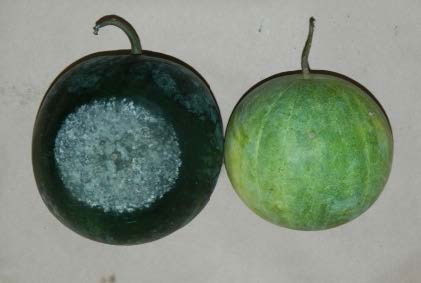
Fruit rot on watermelon
Image provided by S. Kousik
Phytophthora capsici:
In watermelon, Phytophthora capsici primarily infects either seedlings or fruit, causing fruit rot. P. capsici is favored by rain and warm temperatures and spreads rapidly via water, including irrigation and surface water sources. The pathogen can overwinter in the soil and spores can persist in infested soil for as long as 10 years. Phytophthora also affects squash and cucumber.
Diagnostic Resources
- A Diagnostic Guide for Phytophthora capsici Infecting Vegetable Crops
by: Camilo H. Parada-Rojas, Leah L. Granke, Rachel P. Naegele, Zachariah Hansen, Mary K. Hausbeck, Chandrasekar S. Kousik, Margaret T. McGrath, Christine D. Smart, and Lina M. Quesada-Ocampo
Plant Health Progress (2021) Vol. 22, No. 3 - Watermelon Disease Key
- MyIPM for Vegetables – An App developed by the Southeastern Vegetable Extension Workers
- Plant Disease Clinics
Disease Control Information
- Are your cucurbits infected with Phytophthora capsici? – Quesada Lab at NC State
- Managing Mildews and Phytophthora Blight Successfully in 2019 Cornell Cooperative Extension
- Phytophthora Blight – Smart Lab at Cornell Vegetables
Infección de Phytophthora (2017) - Phytophthora Blight and Its Management in Cucurbit Crops and Other Vegetables – McGrath Lab at Cornell’s Long Island Vegetables
- Phytophthora Blight in Cucurbit Crops – Long Island Horticultural Research & Extension Center at Cornell University
- Plant Pathology Disease Factsheets – Hausbeck Plant Pathology Research Lab at Michigan State University
Managing Phytophthora on Cantaloupe, Muskmelon and Watermelon
Manejo de Phytophthora en Cantalupe, Melón y Sandia - Vegetable Diseases Caused by Phytophthora capsici in Florida (2018, 2021) UF/IFAS Electronic Data Information System
